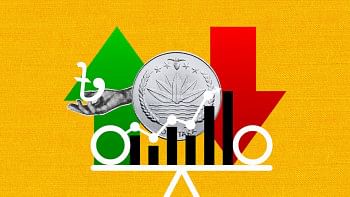Why you should care about net neutrality

Over the past year or so, you have probably heard that a contentious "fight" about net-neutrality was taking place in the US, and you might have thought—"why should I care?" If you are a person who uses the internet for more than five minutes a day, you should care because it may soon affect you. Whether it is checking your emails while stuck in Dhaka traffic, scrolling through Facebook and Instagram posts on your phone, or watching YouTube or Netflix videos at home—all these are likely to be affected by how this issue plays out in the US.
It is very hard to describe the complexities of the overlapping structures that form the internet, but a useful analogy would be a complicated system of water pipes. You might only be consuming the water (data and services) but if there is only one pipe that delivers to you, you do not want someone else deciding what, how much, or when the water will be delivered. Net neutrality rules are a guarantee that others cannot decide this for you. These rules ensure that Nafisa from Dhaka visiting google.com using a specific Internet Service Provider (ISP) will not be treated any differently than Wahid browsing yahoo.com while using a different ISP during his weekend trip in Chittagong. It means that your ISP cannot choose to make a deal with Amazon Video to allow them to stream high-definition (HD) video to your TV and computers, but not allow you to watch Netflix in HD. Thus ultimately net neutrality is about fairness and equality on the internet.
What would a world without net neutrality look like? One such scenario would be where certain websites and services partner with some internet providers and offer their own products at a cheaper rate, or at faster speeds while slowing down their competition, or even charging them a higher fee. An extreme version might even see an internet provider completely blocking access to a website like Netflix because it supports a different competitor like YouTube. This sounds horribly unfair does it not? If this sounds familiar, it is because parts of this horror story are already playing out in different countries around the world. Facebook's Free Basics service allows Robi subscribers to browse Facebook for free. Using Facebook's Free Basics or its Internet.org service gives you a walled version of the internet in several countries. It is a version of the internet that Facebook controls—where it sets and enforces rules as it chooses. Google has plans for its own version. Some people may argue that there is nothing wrong here—the underserved are getting access to the internet for free. Is that really the case? Or is it Facebook and Google ensuring that people use only their services—a race to capture the next billon users? If this was really about corporate social responsibility (CSR) and helping the poor and the underserved, then these corporations would support and subsidise the whole open internet, and not just their own services.
I am an economist who works on applied microeconomic issues. I deal with how markets work, who pays what, and why. I can tell you that on the internet, if you are getting something for free now, you will either be paying in the future or you are the product. What does that entail? It means that these companies collect and aggregate your personal information and then send targeted ads to you. It means minute details of your likes and dislikes are stored and then sold on to companies who might want to sell you their products. It means a loss of control of your own personal data, your sense of privacy.
As an economist, I can also tell you that "efficiency" and "fairness" don't always go hand in hand. In economic parlance, the argument for removing net neutrality rules is that it will improve efficiency. The argument that is offered goes along these lines: removing rules and regulations will allow companies to innovate, come up with new ideas—like Facebook's Free Basics—and make the world better. This ignores the notion that some rules are needed to prevent anarchy. That these giant corporations are not benevolent organisations—rather they seek to make profits. The understanding that a regular consumer is not as powerful or as well-informed as a giant corporation who may not have the consumer's best interests at heart. That in the early days of the web we saw walled and gated versions of the internet, most famously offered by AOL, and that it was the decline of AOL that saw the explosive growth and rapid innovation that lead to the version of internet and the World Wide Web that we enjoy today.
Talking about net neutrality is important, because it does not exist in Bangladesh. There are no laws regulating ISPs asking them to treat all data equally. ISPs are more than welcome to pick winners and losers, or even coerce payments from others. This might not be important at this very moment, but it may soon become significantly so. ISPs already have broad powers to restrict access to websites under the directive of courts and governments and have done so in the past. We as consumers have little recourse but to protest loudly against such moves. Yet it is important to discuss and inform public opinion so that our leaders start taking consumer rights and concerns into consideration. We need strong laws and guidelines to ensure that our citizens are not harmed. We have made significant leaps in providing access to the general public. The government's broad initiatives under Digital Bangladesh and Vision 2021 have resulted in more than 73 million internet users and 21 million people on social media as of June 2017 according to internetworldstats.com. It is important that we do not forget to protect them too.
Which brings me to this following anecdote and my current headache. I often find it interesting to run internet speed tests whenever I feel things are not working as fast as they should. So back home in Dhaka for a brief two week break in the midst of the wedding season, I took a few minutes to run a few speed tests to ensure that a certain unnamed ISP was sticking to its claim of offering me a dedicated 8 Mbps connection. Netflix's own fast.com (great because it has a memorable name and thus easy to recommend to others) which I consider to be the gold standard informed me that I was getting speeds up to 6.9 Mbps. Considering I have a complicated situation with three different routers and an extender set up as the "network", I found the results reasonable. Running a test on speedtest.net of course made me question the trustworthiness of my ISP. Consistent results of 25-28Mbps. Four times what fast.com says. I wonder why they are so different? An attempt to game the system perhaps?
Rizwanur Rob is a PhD candidate at Northeastern University, Boston working on the economics of education, labour and innovation, and the creator of dhakaeconomist.com where he discusses interesting real world problems.





Comments